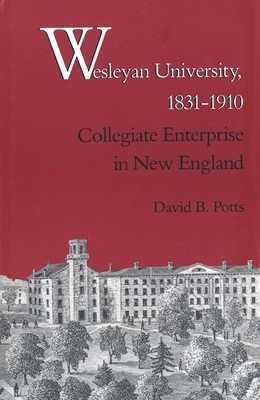
- We will send in 10–14 business days.
- Author: David B Potts
- Publisher: Yale University Press
- ISBN-10: 0300051603
- ISBN-13: 9780300051605
- Format: 16.4 x 24.1 x 3.5 cm, hardcover
- Language: English
- SAVE -10% with code: EXTRA
Reviews
Description
This lively narrative connects Wesleyan University to economic, religious, urban, and educational developments in nineteenth-century America. David B. Potts places Wesleyan's history in contexts that illuminate the dynamics of institutional change and contribute new perspectives on the nation's colleges, culture, and society. Potts explores Wesleyan's origins as a local enterprise in which citizens of Middletown, Connecticut, supplied land, buildings, and endowment pledges for a college that they organized in concert with Methodist clergy in New York and New England. He traces the dissolution of this alliance and the emergence of a thoroughly denominational institution that initiated coeducation in 1872. A second shift in identity, achieved by 1910, led Wesleyan to discard Methodist control and the education of women in return for status as a New England liberal arts college. Drawing on a wide range of manuscript collections, newspapers, and other sources, Potts describes faculty professionalization, trustee philanthropy, student discrimination against blacks and women, early rumblings of religious fundamentalism, and efforts of prestige-conscious alumni who pulled the country college into a financial and cultural orbit around New York City. Throughout he compares Wesleyan's history to developments at other New England colleges and universities.
EXTRA 10 % discount with code: EXTRA
The promotion ends in 18d.00:19:25
The discount code is valid when purchasing from 10 €. Discounts do not stack.
- Author: David B Potts
- Publisher: Yale University Press
- ISBN-10: 0300051603
- ISBN-13: 9780300051605
- Format: 16.4 x 24.1 x 3.5 cm, hardcover
- Language: English English
This lively narrative connects Wesleyan University to economic, religious, urban, and educational developments in nineteenth-century America. David B. Potts places Wesleyan's history in contexts that illuminate the dynamics of institutional change and contribute new perspectives on the nation's colleges, culture, and society. Potts explores Wesleyan's origins as a local enterprise in which citizens of Middletown, Connecticut, supplied land, buildings, and endowment pledges for a college that they organized in concert with Methodist clergy in New York and New England. He traces the dissolution of this alliance and the emergence of a thoroughly denominational institution that initiated coeducation in 1872. A second shift in identity, achieved by 1910, led Wesleyan to discard Methodist control and the education of women in return for status as a New England liberal arts college. Drawing on a wide range of manuscript collections, newspapers, and other sources, Potts describes faculty professionalization, trustee philanthropy, student discrimination against blacks and women, early rumblings of religious fundamentalism, and efforts of prestige-conscious alumni who pulled the country college into a financial and cultural orbit around New York City. Throughout he compares Wesleyan's history to developments at other New England colleges and universities.


Reviews